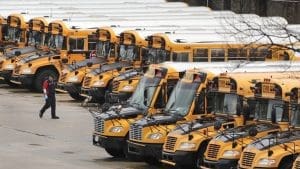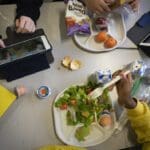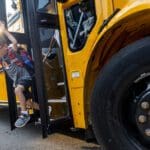Opinion: Discovering the other
Being ‘the other’ isn’t something students are born with. It is something they are taught.

By Jaylen Adams and Addie Lentzner
For the better part of childhood, I had no idea that I was different. Too often we assume children came out of the womb knowing how others see them. The blond child knows blondness is synonymous with ditziness. The loud child knows high volume is generally seen as obnoxious and annoying. The Black child knows Blackness is otherness.
None of this is true. No child is born playing a “Spot the Difference” game with themselves and others. Most children do not understand physical differences until much later in life. It can then be understood that for Black children, the experience of learning the Self and Society can be quite alarming.
For me, it started with beauty tutorials. I was around 12, and puberty had waged a war upon my skin. So I bought concealer and looked up tutorials on how to use it. Only, the dots I attempted to blend were always three shades lighter than me, undertones colder instead of warmer. My favorite influencers were Nikkie Tutorials, Jaclyn Hill, and even Jeffree Star. Each was phenomenal at their craft, but my makeup looks would never look like theirs. Soon, I realized something — their tutorials were simply not meant for me.
That was the beginning of being “the other.” It isn’t something students are born with. It is something they are taught. Just like they are taught the existence of differences, many students are also taught on how to demonize those differences. In my middle school, I was often the punchline of jokes. I would hear comments about my “African lips” or be asked, “Why aren’t you on the field picking cotton?” The worst part was: They often came from my own Black peers.
I had the blessing of having a kind family. My mother would always call me beautiful and praise my curly hair. My aunt would buy me dolls who looked like me. My grandmother would tell me stories of unkind histories, read me books about Malcolm X and Angela Davis. In having an education like that, I was able to avoid the self-hatred so many of my classmates fell prey to.
In being a witness to my peers’ internal and external racism, I quickly became involved in social justice. I was blessed enough to join the Charlotte Mecklenburg Youth Council early. As a representative of the school district, I spoke at length about racial disparities and equity. Every space I stepped into, I began to learn more and more. From serving on the Juvenile Crime Prevention Council aiming to lower recidivism rates to the Title IX Committee advocating for reproductive rights, there was no shortage of misinformation, injustice, and hurt. However, it was through my work as an executive fellow at Our Turn, an education reform nonprofit, that I began to understand most issues trail back to that first moment of recognizing otherness … and learning how to deal with that in a positive way. It is that first moment of realizing, “Oh, you are different from me” and seeing uniqueness in that difference, not inferiority. That moment is found in schools.
I could have been like those students who asked insensitive questions for no other reason but spite. Only, I had a good education. Why shouldn’t all students receive a similar education? Isn’t the sole purpose of education to prepare students to make a better, kinder world for themselves and for their children? I was lucky, but when we are talking about not only the elimination of ignorance, but also the safety of our BIPOC students, we should never rely on luck.
Jaylen Adams (she/her) is a first-year student at Columbia University, studying political science-economics and creative writing. During her high school career, she was a co-president of the Charlotte-Mecklenburg Youth Council, a representative on the Juvenile Crime Prevention Council, and a voice for women on the Title IX Committee. Today, she works with Our Turn, a national education reform nonprofit, as an executive fellow.
Addie Lentzner (she/her) is a student at Middlebury College in Vermont. She is the founder of the Vermont Student Anti-Racism Network, a student group that has donated 250 books on race to elementary schools and written legislation to promote anti-racist schools. She also led a campaign to extend a housing program in Vermont and helped pass legislation around homelessness and affordable housing. She is a communications fellow with Our Turn and is really passionate about education justice.
Recommended

Alaska House committee advances, expands proposal to bar trans girls from girls sports
Amended bill would add elementary, middle school and collegiate sports to limits in place for high school
By Claire Stremple, Alaska Beacon - April 16, 2024
Senate clears gallery, passes bill to arm Tennessee teachers
Covenant parents emotional in wake of vote
By Sam Stockard, Tennessee Lookout - April 10, 2024
Not if, but when: Parents of slain Parkland students urge Utah lawmakers to pass school safety bill
The parents of children killed in the 2018 Marjory Stoneman Douglas High School shooting have a stark warning for Utah lawmakers: “It’s not a matter of if, it’s a matter of when and where the next school shooting will happen.”
By Kyle Dunphey, Utah News Dispatch - February 21, 2024









































































